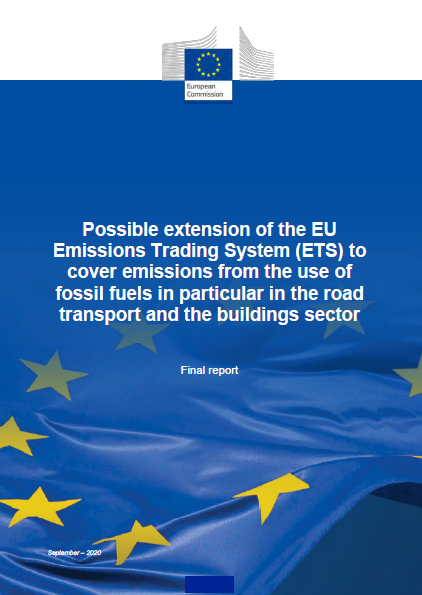Possible Extension of the EU Emissions Trading System (ETS) to Cover Emissions from the Use of Fossil Fuels in Particular in the Road Transport and the Buildings Sector
- Publication
- Citation
European Commission (ed.) 2021: Possible extension of the EU Emissions Trading System (ETS) to cover emissions from the use of fossil fuels in particular in the road transport and the buildings sector. Luxembourg: Publications Office of the European Union.
To meet its increasingly stringent emissions reduction targets, the European Union plans to extend the use of emissions trading, to also cover emissions from road transport and buildings. To understand the effects of this move, DG CLIMA commissioned a comprehensive analysis to investigate the economic, social, environmental, and regulatory / administrative implications. Together with partners ICF, eclareon, Enerdata, Fraunhofer Institut, Cambridge Econometrics, CITEPA, and Milieu, the Ecologic Institute investigated the general options for either the extension of the existing EU ETS or the introduction of a stand-alone scheme.
The objectives of this study were to:
- Explore options for possible inclusion of CO2 emissions into an emissions trading system from the road transport and/or buildings sectors.
- Assess with qualitative and for selected questions also quantitative tools the relevance and the impacts of the identified options, focusing on effectiveness (emissions reduction achieved in both sectors), on regulatory robustness (monitoring, reporting and verification), as well as distributional effects on households and small and medium enterprises (SMEs) and potential quantitative impacts on the existing EU Emissions Trading System (ETS) and the Effort Sharing Regulation (ESR).
- Explore the option for possible inclusion into an EU emissions trading system of all CO2 emissions from fossil fuels.
The Ecologic Institute contributed by investigating the extent to which transport and buildings are already affected by the existing EU emissions trading scheme, e.g. through district heating networks and electric mobility. Moreover, the Ecologic Institute contributed case studies on non-European emissions trading schemes covering transport and/or buildings (including California, New Zealand and Tokyo). Furthermore, the Ecologic Institute provided analyses on which price-based instruments are already applied in selected EU member states. Finally, the Ecologic Institute examined how the expansion of emissions trading would affect competitiveness, whether and how it could lead to double counting or slippage of emissions, and how the extension of emissions trading would be compatible with the EU's existing climate policy instruments.




